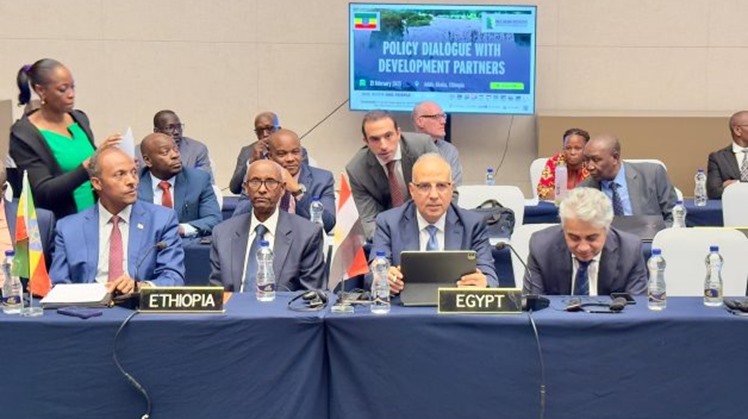CAIRO – 23 February 2025: Egyptian Minister of Water Resources and Irrigation Hani Sewilam has strongly reiterated Cairo’s objection to the inclusion of a visit to the controversial Grand Ethiopian Renaissance dam (GERD) as part of the Nile Day celebrations.
This came during the extraordinary ministerial meeting (Nile-COM) of the Nile Basin Initiative (NBI) held on February 21, 2025 in Addis Ababa, Ethiopia.
The minister emphasized that the Ethiopian dam was constructed, filled, and is being operated unilaterally, in violation of international law and in breach of the 2015 Declaration of Principles Agreement.
He further highlighted that Egypt has consistently addressed the Ethiopian dam issue with restraint, insisting that it remain a trilateral matter between Egypt, Sudan, and Ethiopia, without expanding the dispute to involve the entire Nile Basin.
The minister noted that Ethiopia’s decision to use its role as host of this regional gathering to promote such a visit risks escalating the ongoing dispute over the dam and dragging the entire Nile Basin into it.
He also warned that this action by Ethiopia could undermine the unity of the basin states and threaten regional cooperation. The minister emphasized that the host country faces a clear choice: either uphold the spirit of unity and protect the basin from unnecessary tensions or proceed with the visit—at the risk of undermining the very purpose of this gathering.
Moreover, he emphasized Egypt’s steadfast commitment to the core principles of the Nile Basin Initiative, emphasizing that maintaining the principle of consensus is crucial for the initiative's long-term sustainability and for maximizing the mutual benefits for all member states. Furthermore, he affirmed that regional stability must be founded on dialogue, cooperation, and mutual respect.
The crisis between the three Nile basin countries dates back to May 2011 when Ethiopia started building the dam, Egypt voiced concern over its water share. Three years later, a series of tripartite talks between the two countries along with Sudan began to reach an agreement while Ethiopia continued the dam construction.
In 2015, the three countries signed the Declaration of Principles, per which the downstream countries [Egypt and Sudan] should not be negatively affected by the construction of the dam. In October 2019, Egypt blamed Addis Ababa for hindering a final agreement concerning a technical problem, calling for activating the Article No. 10 of the Declaration of Principles, which stipulates that if the three countries could not find a solution to these differences, they have to ask for mediation.
Despite Egypt’s repeated rejections, Ethiopia continued its unilateral acts and filled the reservoir of its dam annually without going back to Egypt or Sudan.
The annual Nile Day meeting, observed on February 22, commemorates the founding of the Nile Basin Initiative (NBI). It was attended by the Water Ministers of South Sudan, Ethiopia, and Kenya, along with the Ambassadors of Rwanda, Burundi, and Tanzania, as well as representatives from Sudan, the Democratic Republic of the Congo, and Uganda.
The Egyptian minister reaffirmed that Egypt has long been a strong advocate for regional cooperation, underscoring its pivotal role in the establishment of the NBI in 1999. Over the first decade of the initiative, Egypt made significant financial, technical, and political contributions, strengthening the NBI as a vital platform for dialogue and collaboration among the basin countries.
However, in 2010, Egypt was forced to freeze its participation in the initiative’s technical activities due to a significant shift in the decision-making mechanism. The core principle of consensus, which had underpinned the initiative’s operations, was disregarded. Additionally, the draft Cooperative Framework Agreement (CFA), which lacked unanimous agreement among all Nile Basin states, was opened for signature. This development deepened divisions within the region, undermining cooperation and escalating tensions among Nile Basin countries.
In this context, Sewilam commended the recent ministerial decision to launch a consultative process involving seven Nile Basin countries—Uganda, South Sudan, Rwanda, Egypt, Sudan, Kenya, and the Democratic Republic of the Congo—aimed at exploring a path forward based on consensus. He described this step as a positive and constructive move toward fostering dialogue and restoring regional cooperation.
The minister reaffirmed Egypt’s full commitment to supporting this consultative process, expressing hope that it would result in an agreement among the concerned countries and pave the way for Egypt’s resumption of technical participation in the NBI once a unified vision is reached.
 Sun, Feb. 23, 2025
Sun, Feb. 23, 2025